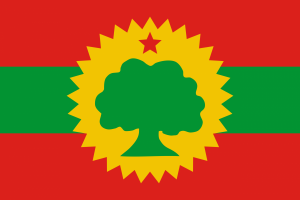Language/Borana-arsi-guji-oromo/Vocabulary/Feelings-and-Emotions
Hi Borana-Arsi-Guji Oromo learners! 😊
In this lesson, we will explore the vocabulary related to feelings and emotions in Borana-Arsi-Guji Oromo. Learning how to express our emotions is essential for communication and building relationships. We will also include cultural information and interesting facts to enrich your knowledge. Don't forget to practice with native speakers on Polyglot Club and ask them any questions you may have! 😎
Basic Vocabulary[edit | edit source]
Let's start with the basics. Here are some common feelings and emotions, along with their translations in English:
| Borana-Arsi-Guji Oromo | Pronunciation | English | |||||||||||||||||||||||||||
|---|---|---|---|---|---|---|---|---|---|---|---|---|---|---|---|---|---|---|---|---|---|---|---|---|---|---|---|---|---|
| Ittiin badeessa / | I'm happy | Ijoollee nala / | I'm sad | Halagaan isinitti dhufan / | I'm angry | Galatoomi / | Thank you | Jira / | Love | Waaqayyoo hin jedhani / | I'm worried / anxious | Ku'usaa / | I'm scared | Awaasha / | I'm tired | Lafa baasuu / | I'm hungry | Gubbuu / | I'm thirsty |
Now practice saying these feelings and emotions out loud. Don't worry about making mistakes, it's all part of the learning process! 😊
Describing How You Feel[edit | edit source]
To describe how you're feeling, you can use the following phrases in Borana-Arsi-Guji Oromo:
- Inni jiraa? (What do you love?) - this is a common way to ask about someone's interests and passions.
- Wal irraa fuudhu? (How do you feel?) - a more direct way to ask someone how they're feeling.
- Ani ittiin badeessa / ijoollee nala / halagaan isinitti dhufan. (I'm happy / sad / angry.) - use this phrase to express how you're feeling.
Here's an example dialogue between two people:
- Person 1: Wal irraa fuudhu? (How do you feel?)
- Person 2: Ittiin badeessa. (I'm happy.)
Now it's your turn to practice! Find a language partner on Polyglot Club and try to have a conversation about your feelings and emotions in Borana-Arsi-Guji Oromo.
Expressions with Body Parts[edit | edit source]
In Borana-Arsi-Guji Oromo, there are also expressions that use body parts to describe emotions. Here are some examples:
- Magaala dalaguu koo! (My heart is happy!) - use this expression to show extreme happiness and joy.
- Caqalaa qixaa koo! (My stomach is laughing!) - use this expression to describe being tickled or amused.
- Danbii qaba koo! (My liver is hot!) - use this expression to describe feeling angry or frustrated.
- Biyyaa gidiraa koo! (My legs are heavy!) - use this expression to describe feeling tired or exhausted.
It may sound strange to use body parts to describe emotions, but it's actually quite common in many languages and cultures. Can you think of any similar expressions in your own language? Share them in the comments below! 😊
Proverbs About Emotions[edit | edit source]
Proverbs are a rich source of cultural knowledge and wisdom. Here are some Oromo proverbs related to emotions and feelings:
- Baayyee hin ciitiin ta'e akeeka dardaraa ta'e. (The person who does not greet you does not love you; the one who greets you with anger loves you.)
- Garaa fi hilaa wajjin nyaatu. (Anger and fear travel together.)
- Koree rafaan cimaa fi fudhataa jira. (Love is never lost and anger loses everything.)
Try using these proverbs in context to improve your Oromo language skills and your understanding of the culture.
Conclusion[edit | edit source]
Congratulations, you have learned the vocabulary related to feelings and emotions in Borana-Arsi-Guji Oromo! Remember to keep practicing and using these words in context to reinforce your knowledge. To improve your Borana-Arsi-Guji Oromo Vocabulary, visit the Polyglot Club website and practice with native speakers. And don't forget to check out the other lessons on Borana-Arsi-Guji Oromo language and culture! 😊
➡ If you have any questions, please ask them in the comments section below.
➡ Feel free to edit this wiki page if you think it can be improved. 😎
Sources[edit | edit source]
Excellent job on conquering this lesson! Consider delving into these related pages: Animals & How to say Good Bye?.

